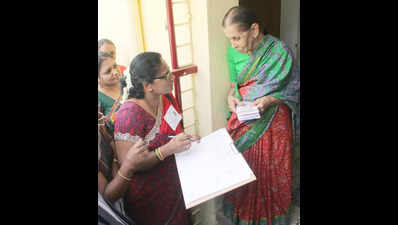In survey of Scheduled Castes, govt measures discrimination via 14-point checklist | Bengaluru News

Bengaluru: In its survey to determine eligibility for internal reservation among sub-groups, the state govt is also attempting to measure the “extent” of marginalisation among Scheduled Caste (SC) communities.
Conducted under the supervision of the Justice Nagamohan Das Committee, the survey features a questionnaire containing 42 questions — including a specific section that sought responses to 14 caste-based discriminatory practices.
Enumerators, guided by a govt-issued survey manual — accessed by TOI — were instructed to collect data on how many of these 14 social stigmas each respondent had faced.
For instance, question 41 read: “Is your household subjected to any social discrimination?” Responses will be classified under the 14 listed practices, which included being denied the right to eat with other castes, being served in separate cups at rural tea shops, restrictions on wearing footwear or carrying umbrellas in front of dominant castes, and denial of entry into upper-caste homes.
The survey also will attempt to capture public space discrimination, including denial of access to temples, roads, and burial grounds or cremation sites. In schools and workplaces, the questionnaire sought data on caste-based practices such as bonded labour, social boycotts for resisting forced labour, and separate seating for SC students — documenting what the committee identified as educational and employment-related untouchability.
This line of questioning is understood to support groundwork for the proposed Rohit Vemula Act, aimed at curbing caste-based discrimination in schools and colleges and introduced by Congress MP Rahul Gandhi and backed by chief minister Siddaramaiah.
Community-level segregation was another key focus. The survey included questions about isolation of SC members during village festivals and events and if they were made to sit or eat separately. It also examined whether similar discriminatory arrangements existed across other public village spaces. Further, responses were sought on the treatment of denotified criminal tribes.
Besides documenting discrimination, the survey assessed the economic, educational, and social conditions of SC households, aiming to build a comprehensive dataset on backwardness across castes.
The report concludes with an excerpt from the survey manual that struck a note of hope: “The best score hasn’t been made yet, the best song hasn’t been sung, the best tune hasn’t been played yet, Cheer up, for the world is young!”
While the report is yet to be made public, officials suggested that the findings could become central to Karnataka’s internal reservation policy, aimed at addressing intra-SC disparities.
















